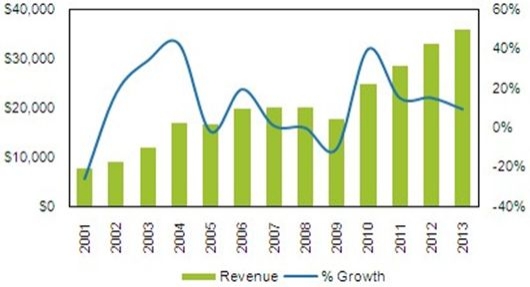July 12, 2010 – Renewed demand for consumer oriented electronics products requiring (generally speaking) more advanced semiconductor devices has caused iSuppli to upwardly adjust its two-month-old revenue forecast for pure-play semiconductor foundries.
The new projection is $29.8M for 2010 semiconductor foundry sales, vs. $24.8B in its May 11 forecast. But the growth hasn’t changed as much (42.3% vs. 39.5%), because the firm also increased its final tally for 2009 ($22.1B vs. $17.8B).
"Consumer spending has come back with a vengeance" after the late-2008/2009 downturns, and foundries are feeling the pressure to keep up, notes Len Jelinek, director and chief analyst for semiconductor manufacturing at iSuppli, in a statement. He pegs a 9.4% CAGR for foundries through 2014 to $45.9B.
 |
|
Worldwide total foundry revenue in US $M. (Source: iSuppli) |
But despite the pressure to keep up with consumer spending, foundries won’t be doing much more of it themselves. iSuppli hasn’t changed its capex forecast for foundries in 2010 — still an eye-popping 123% year-on-year increase, though, mostly to develop advanced chipmaking processes. Older processes will continue to suffer capacity constraints, he noted; this also implies that IDMs hoping to improve runrates for legacy manufacturing won’t find available capacity this year.
Another point: China’s semiconductor manufacturers weren’t able to develop technology differentiation or expand manufacturing during the downturn, and price alone now won’t be enough to provide needed growth to domestic foundries. “The era may be coming to an end when fabless suppliers look to China for low-cost manufacturing that could be used as leverage to obtain lower pricing from other foundries,” Jelinek said. State-funded expansion has also slowed, so future expansions are likely to be minimal, and any frontend expansion will likely happen through municipal governments — financial models that were used to justify previous expansions fell short of investment expectations, he noted.

